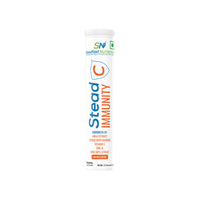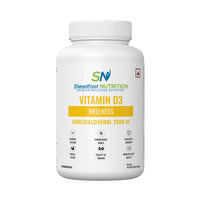Table of Content
Nowadays, vitamins for your skin are quite important as people are extremely concerned about their skin for varied reasons. First and foremost, good skin is frequently connected with beauty. Clear, glowing skin is a desired attribute, motivating people to invest time and money on skincare.
Moreover, the skin is the body's largest organ and acts as the first line of defence against environmental hazards such as UV radiation, pollution, and bacteria. Maintaining good skin is essential for overall health and well-being, as it helps avoid infections and premature ageing. Unfortunately, skin diseases such as acne, eczema, and psoriasis can cause physical and mental pain, prompting people to seek effective treatments and preventive measures.
Overall, the desire for healthy, appealing skin is motivated by both aesthetic & health conditions.
Are You Getting the Right Vitamins for Your Skin?
Getting the correct vitamins for your skin is critical for keeping it healthy and looking good. The first step is to eat a well-balanced diet that includes foods high in Vitamin A (sweet potatoes and carrots), Vitamin B complex (whole grains and nuts), Vitamin C (citrus fruits, guava, bell peppers, and broccoli), Vitamin D (fortified foods and moderate sun exposure), Vitamin E (nuts and vegetable oils), and Vitamin K (leafy greens). If your diet is deficient in some vitamins, consider taking SteadC from the house of Steadfast!
SteadC provides vitamin C that promotes skin health, delaying ageing by stimulating collagen synthesis and reducing hyperpigmentation. It minimises wrinkles and improves skin elasticity, resulting in a more youthful and beautiful complexion.
Ideal for keeping smooth, vibrant skin and preventing the effects of ageing. Vitamin C present in the epidermal layer assists in protection against damage from UV rays. Moreover, it acts as an antioxidant, neutralising and removing free radicals and preventing oxidative damage.
Additionally, apply skincare products supplemented with vitamins C, E, and B3 (niacinamide) for direct topical advantages. Maintaining a healthy lifestyle, which includes being hydrated, getting adequate sleep, and avoiding smoking and excessive alcohol intake, also benefits skin health. You can ensure that your skin obtains the vitamins it requires to be healthy, radiant, and resilient by combining a nutritious diet or supplements if needed to maintain its quality.
5 Vitamins that are good for Skin
Vitamins are vital for healthy, glowing skin. Vitamin A stimulates cell turnover and supports collagen formation, which reduces wrinkles. B vitamins strengthen the skin's barrier and promote healing. Vitamin C, a potent antioxidant, brightens the skin and increases collagen production. Vitamin D promotes cell growth and repair, whilst vitamin E moisturises and protects against UV damage. Finally, Vitamin K promotes healing and decreases dark circles. Together, these vitamins keep your skin youthful, resilient, and shining.
These vitamins promote collagen formation, defend against environmental damage, support cell turnover and repair, keep skin hydrated, and reduce inflammation. Incorporating these vitamins and supplements into your diet and skincare routine can enhance your skin's texture, tone, and look. Vitamins help reduce the signs of ageing and manage skin disorders, including acne and eczema.
Let’s understand how these vitamins help your skin look beautiful & flawless!
Vitamin A:
One of the best vitamins for your skin, vitamin A is best known for its anti-aging qualities. It is an essential nutrient known for its tremendous benefits to skin health. In its many forms, such as retinoids and carotenoids, vitamin A provides numerous benefits for skin health. It increases collagen formation and improves skin suppleness while also minimising the appearance of fine lines and wrinkles. Its capacity to increase cell turnover results in smoother, more evenly toned skin.
And do you know? Vitamin A is extremely useful in acne therapy. It helps manage and prevent breakouts by inhibiting sebum production, controlling oil, and reducing acne. Additionally, its anti-inflammatory effects help reduce the redness and inflammation associated with acne.
Besides its cosmetic effects, vitamin A is essential for overall skin health. However, one must exercise caution while taking vitamin A derivatives because they might cause skin irritation, particularly when first used or at high concentrations.
In a nutshell, Vitamin A is a key ingredient in skincare, providing numerous benefits for preserving youthful, clear, and healthy skin.
Vitamin B:
Vitamin B, one of the best vitamins for your skin, specifically niacinamide (Vitamin B3) has proven to be a boon for skin health. It’s like a secret ingredient in skincare, providing a slew of benefits to help you brighten the skin tone. First, niacinamide is excellent for soothing inflamed skin, whether you have acne breakouts or sensitive redness. But that's not all - it also improves the skin barrier.
Niacinamide could be your new best friend as it helps tighten pores, giving your skin more suppleness. And here's the best part - niacinamide can gradually balance out your skin tone and remove dark spots, resulting in a brighter and more even complexion. Adding Vitamin B to your skincare routine can help with acne, dryness, and overall skin health. It's simple to apply and can significantly improve the health and appearance of your skin.
Vitamin C:
Vitamin C isn't just good for fighting colds, it’s also an excellent nutrient for your skin. To start with, vitamin C is a powerful antioxidant, which means it protects your skin from environmental damage caused by pollutants and UV rays. It's like putting a protective barrier on your skin against regular pressures. But that's not all - vitamin C is also great for increasing collagen production, which helps decrease the appearance of fine lines and wrinkles, giving you smoother, plumper skin.
If you have uneven skin tone or dark patches, vitamin C can also assist! It suppresses melanin production, so it helps remove existing dark spots while preventing new ones from being visible, leaving your skin looking more even and shiny. Here's a bonus that comes with the usage of Vitamin C - it contains anti-inflammatory effects, thus it is ideal for reducing redness and irritation in sensitive or acne-prone skin. Whether you want to brighten your complexion, battle symptoms of ageing, or simply give your skin a healthy boost, incorporating vitamin C into your beauty routine is worth considering. Your skin will thank you for this!
Vitamin D:
Vitamin D, widely known as the "sunshine vitamin," is important for overall health and plays a quite good role in keeping good skin. One of the most notable points of vitamin D is its ability to regulate the skin's barrier function. A strong skin barrier helps maintain moisture, avoids dryness, and protects against environmental aggressors such as pollution and damaging UV radiation. Vitamin D regulates cell division which prevents premature aging.
Vitamin E:
Vitamin E is nature's moisturiser and protector for your skin, providing great advantages that can help make your skin healthy and attractive. Its moisturising properties assist in keeping your skin soft, smooth, and hydrated. It creates a protective barrier that locks in moisture, making it especially effective for people with dry or dehydrated skin. It has more to it - vitamin E is also an effective antioxidant. It fights free radicals, which can harm skin cells and hasten ageing. Vitamin E, one of the best vitamins for skin, helps prevent wrinkles, fine lines, and other indications of premature ageing produced by free radicals.
Vitamin E is also quite famous among beauty influencers for promoting healing and reducing the appearance of scars. It promotes the healing of injured skin cells, allowing wounds to heal faster and minimising the visibility of scars over time. Additionally, vitamin E has anti-inflammatory effects that can help relieve irritated or inflamed skin. It is soft enough for delicate skin and can alleviate symptoms of eczema and dermatitis.
Vitamin E, whether applied topically or absorbed through your diet, can help maintain a healthy, young complexion while also protecting your skin from external damage. So, if you want smoother, more radiant skin, vitamin E is well worth trying, as it is one of the best vitamins for your skin.
Consult a Dermatologist for Healthy, Radiant Skin
Consultation with a dermatologist is required to achieve and maintain healthy, glowing skin. Dermatologists offer precise diagnoses, tailored treatment programmes, and access to innovative procedures. They provide expert advise on skincare products and preventative care to help treat and prevent skin problems. Consultation should include a medical history review, skin examination, discussion of issues, and treatment recommendations. Regular visits help to track improvements, update treatments, and provide vital skincare instructions. A dermatologist's skill ensures that your skin remains healthy and radiant.
Conclusion
Achieving good skin requires a lot of effort. It demands for a consistent skincare regimen, a healthy diet, appropriate hydration, and sun protection. Regular washing, moisturising, and exfoliation can help keep your skin healthy. Additionally, managing stress, getting enough sleep, and avoiding habits such as excessive smoking can have a substantial impact on skin quality. Consulting a dermatologist for personalised guidance and treatments can also help you keep vibrant, healthy skin.



